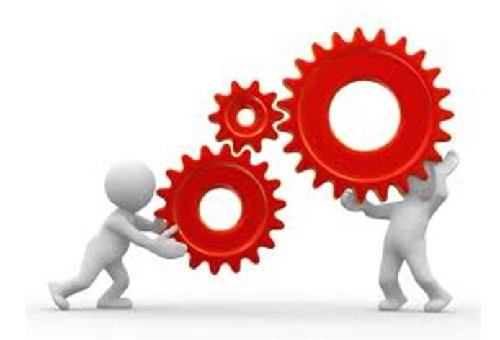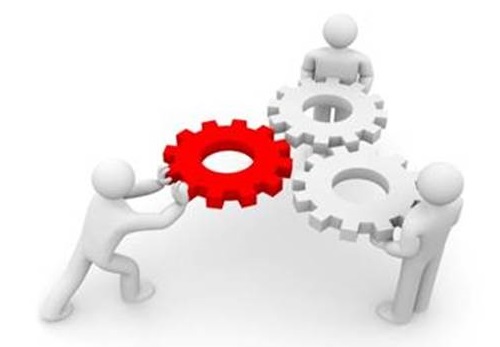3 Function 
3.1 Mission
Mission, vision, goal, areas, function

A vision without action is a dream. Action without vision is a nightmare. Japanese proverb
If the vision is what we want to create, the vision of top management and staff must be shared.
The story of the three stonecutters conveys a great deal. When asked about their work:
- the first replied that he is cutting stones for a living
- the second that he tries to be the best stonemason in the country
- while the third answered that he is building a cathedral
Hence the three main types of relationship to work:
- livelihood
- career
- vocation
Quality manager: leader in the journey to excellence
The main mission of the quality manager is to contribute to the sustainable development of the company. For this the quality manager is not a technical expert but masters, maintains and improves the quality management systemset of processes allowing the achievement of the quality objectives (see also ISO 9000, 3.2.3). The quality manager actively supports:
- the realization of a remarkable system
- obtaining results of excellence
This fundamental goal must be achieved through ordinary efforts by ordinary people.
The quality manager must also anticipate and lead change (see § 8.4).
Priority areas:
- support staff to do their job well
- analyze the level of conformity of the outgoing product to:
- customer requirements
- regulations
- optimize and simplify the management system
- explain the benefits of the management system
- evaluate the means put in place and the results obtained
- monitor the perception of customer satisfaction
- compare yourself to the competition
A few ways to fulfill your mission:
- create conditions in which staff:
- participates and gets involved in the life of the company
- is in direct contact with the customer
- deploys their talents
- enjoys working
- is proud of their results
- knows that their efforts will be recognized and rewarded
- train and guide all staff in good practices
- manage risks (essential process) to make the right decisions at the right time (see § 7.4)
- promote sharing of ideas
- show and praise the contribution of each to the purpose of the company
- anticipate the future
- ask yourself the question before each activity and decision: will this help to improve overall performance?
As "no one is supposed to ignore the law", no one is supposed to ignore the standard in a certified company. In the company, the quality manager is the person who translates the requirementsexplicit or implicit need or expectation (see also ISO 9000, 3.1.2) of the standard into simple terms.
To justify their function (and that of their department) the quality manager must also speak the language of top management: money.
By carrying out FMEAs upstream, which we will see in § 9.1, the quality manager can easily explain how many losses are avoided by:
- designing right the first time and
- making it right the first time, all the time
By training all staff to make small, common-sense improvements on a daily basis, the quality manager will help ensure that objectives are met. The contribution of the Kaizen philosophy (see § 9.2) to the development of staff at work is decisive.
By setting up the COQcosts of obtaining quality approach (costs of obtaining quality), which we will see in § 9.3, the quality manager can easily demonstrate how much conformity and nonconformity cost and above all quantify the reduction in real costs or profits made.
By hunting down waste, the quality manager can easily quantify how much the waste that the Lean approach has helped to eliminate would have cost (see § 9.4).
3.2 Position
Position, customer interests, company pyramids, communication, function

It is not the employer who pays wages, it is the customer. Henry Ford
The quality manager constantly seeks (and often achieves) a reasonable balance between their position and that of the customer (see figure 3-1):

Figure 3-1. Position of the quality manager
It's no coincidence that the term "customer-king" is sometimes replaced by "customer-boss".
The quality manager is always and at the same time:
- top management's representative within the company
- top management's privileged contact
- customer's ambassador within the company
- company's representative to the customer
This position, of always preserving the balance (reaching an acceptable compromise) between the (often contradictory) expectations and needs of all stakeholders, is at the heart of the quality manager's job. Let's not forget that for our supplier we are their customeranyone who receives a product (see also ISO 9000, 3.3.5), and for the customeranyone who receives a product (see also ISO 9000, 3.3.5) we are their supplier.
Examples of stakeholders:
- customers, consumers
- employees
- environment
- shareholders, investors
- suppliers, subcontractors, partners
- industry organizations and associations
- legal and regulatory authorities
When choosing between the interests of the customeranyone who receives a product (see also ISO 9000, 3.3.5) and those of the company is difficult, do not hesitate to ask top management to have the last word.
As the customeranyone who receives a product (see also ISO 9000, 3.3.5)'s ambassador in the company, the quality manager imports the customeranyone who receives a product (see also ISO 9000, 3.3.5)'s requirementsexplicit or implicit need or expectation (see also ISO 9000, 3.1.2) into each department. The quality manager constantly monitors their application and compliance.
A proof of the deep commitment of top management for the continual improvementpermanent process allowing the improvement of the global performance of the organization (see also ISO 9000, 3.2.13 and ISO 14 001, 3.2) of the performance of the company is the participation of the quality manager in the management committee.
The job of quality manager is exciting because their interlocutors are many and varied:
- top management
- executives
- heads of departments
- process owners
- customers
- suppliers
- auditors from certification bodies and
- other stakeholders
The communication of the quality manager (cf. paragraph 8.1) with all these people is:
- regular (often daily)
- bilateral (in both directions)
- direct (as few intermediaries as possible) and
- priority (privileged interlocutor)
The quality manager is also an internal balancing act because this role is in the middle of the company's pyramids, cf. figure 3-2:

Figure 3-2. Company pyramids
To the hierarchical pyramid (on the left) representing the number of people and the level of detail corresponds an inverted pyramid, showing the responsibilities and the relationship to time.
The quality manager is always between top management (who are not concerned with the details but who have great responsibilities and a distant view of time) and the staff (who are overwhelmed with details and have a fairly short time horizon).
The function of quality manager is transversal: the quality manager is present in all departments to support them in the quality processactivities which transform inputs into outputs (see also ISO 9000, 3.4.1). But it's up to the processactivities which transform inputs into outputs (see also ISO 9000, 3.4.1) owners to:
- manage the documentation
- establish and monitor the indicators
- hunt for waste (activities without added value)
- lead process reviews
- optimize opportunities for improvement
The quality manager must translate certain notions (concerns and problems) to top management (who must have their last word) but also to staff (such as strategy, long-term project) so that motivation is there.
It would be a waste of time to use management phrases like “improved working capital” on the shop floor. It is better to explain that a customeranyone who receives a product (see also ISO 9000, 3.3.5) may not return due to problems with our productsany outcome of a process or activity (see also ISO 9000, 3.4.2) or that any waste is expensive and it is blessed bread for competitors.
A team leader explains to the quality manager that we quickly need at least three new multimeters in the workshop so that the verification activities can be done in parallel (thus saving time).
The purchase validation procedure being what it is (four signatures), the young quality manager decides to go directly to see the director and asks him to sign an exceptional purchase authorization.
The director refuses and tells him that this is not the right method. He is the director for making decisions, managing conflicts, negotiating consensus and not for solving everyday problems.
The director explains to the quality manager that he should submit to him either the validation of a simplified purchasing procedure or a decision to allocate an annual sum to each team leader for this type of tool.
Maintaining the delicate balance at all times to satisfy everyone (the customeranyone who receives a product (see also ISO 9000, 3.3.5), the staff, top management) is an exercise that sometimes requires virtuoso qualities on the part of the quality manager, but often simple common sense is enough.
 Minute of relaxation. Cf. joke "Golden contract"
Minute of relaxation. Cf. joke "Golden contract"
3.3 Role and responsibilities
Role, responsibilities, obligations, limits, rights

3.3.1 Role
The quality manager prepares, implements, maintains and improves the quality culture in the company on a daily basis. The quality manager is more:
- conductor and not one-person-orchestra
- mentor and not administrator
- advisor and not leader
- project manager and non-expert
- coach and non-manager
- guide and not director
- consultant and not boss
- inspiration and not master
The quality manager demonstrates, explains and teaches the use of quality approaches and tools. Sometimes the quality manager gets personally involved but does not forget that:
When a man is hungry, it is better to teach him to fish than to give him a fish. Lao Tzu
Sometimes the quality manager has to put out the fire, but the role is precisely to do everything to avoid the role of the firefighter because:
Prevention always costs less
The traditional role of a quality manager is to:
- help meet the needs and expectations of customers (see the first principle of quality management, § 1.2.1)
- prepare the implementation of the QMS
- ensure that quality is not seen as a burden but as an advantage
- coordinate QMS maintenance and improvement activities
- show the link between improvement and result obtained
- translate the requirements of the standards into the language of the company
- ensure regulatory monitoring (legal watch)
- control risk prevention
- coordinate and facilitate the application of quality approaches and tools
- contribute to the success of continual training
- make working conditions more attractive
Some believe that the quality manager must also translate the customeranyone who receives a product (see also ISO 9000, 3.3.5)'s requirementsexplicit or implicit need or expectation (see also ISO 9000, 3.1.2) into internal requirementsexplicit or implicit need or expectation (see also ISO 9000, 3.1.2). The quality manager can and even must help the project manager in this activity, but it must remain within reasonable limits, it's like believing that the quality manager must write all the procedures of the company!
3.3.2 Responsibilities
The quality manager has obligations (responsibilities) and rights (authorities), cf. annex 04. As the name of the function indicates, above all, the quality manager has responsibilities that are fully assumed.
Example of a list of obligations of a quality manager:
- support top management for the establishment of the quality policy
- regularly ensure that the QMS is established, implemented, maintained and its effectiveness improved
- assist process owners in the analysis of indicators
- coordinate with the production and development teams:
- delivery of finished products
- process review
- the industrialization of new products
- manage risks upstream, exercise a risk alert role with top management
- continually improve the effectiveness of the QMS and regularly report the level reached to top management
- know how to adapt to changing customer requirements
- analyze customer complaints and participate in the implementation and monitoring of corrective and preventive actions
- ensure the achievement of quality objectives
- manage, improve and distribute the quality documentation system (including the manual, process forms, procedures, work instructions and job descriptions)
- keep the applicable regulatory texts up-to-date
- monitor the entire metrological fleet
- coordinate all continual improvement activities (including staff awareness of the quality approach)
- prepare and animate the management review
- plan and monitor audit activities:
- internal
- of suppliers
- of subcontractors
- analyze trends in customer perception (satisfaction surveys)
- represent the company for external QMS audits
- propose and monitor the training program
- master the reception inspections, in line, of the finished products
- regularly monitor quality indicators and other information on dashboards
- promote good practices and encourage the successes achieved
- take measures to analyze the failures and eradicate the causes
- communicate in time the information in its knowledge with the other departments
Example of a list of rights of a quality manager:
- give the green light for the launch of a new product
- stop production, block a delivery and withdraw from the market products that have shown a defect
- after risk analysis authorize derogations in agreement with the customer
- request and receive the necessary information of any activity
- stop using obsolete or non-compliant documents
- participate in management committee meetings
- coordinate the administrative management of the personnel of the department
- increase their qualification in accordance with the company's training program
.jpg) Minute of relaxation. Cf. game: Responsibility
Minute of relaxation. Cf. game: Responsibility
